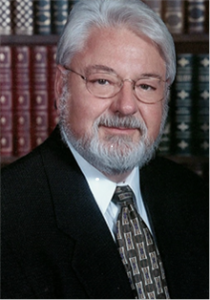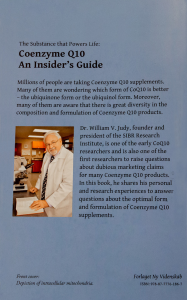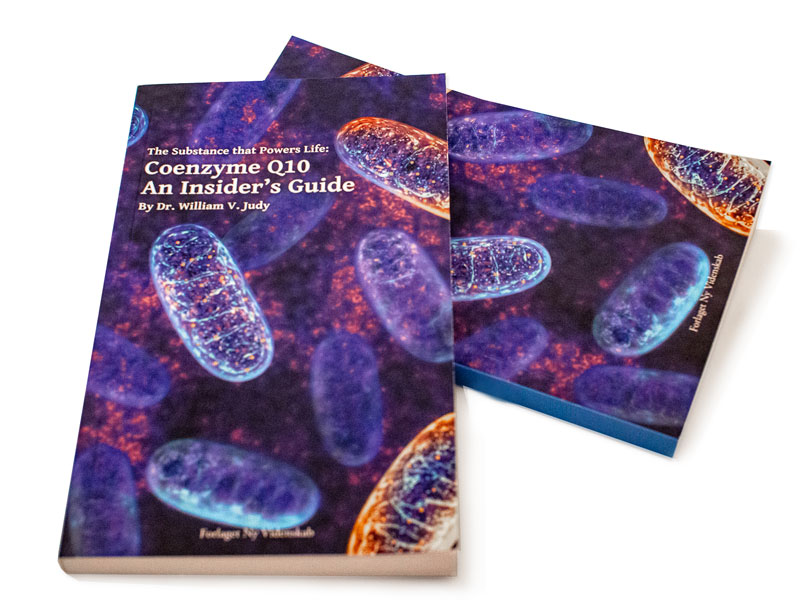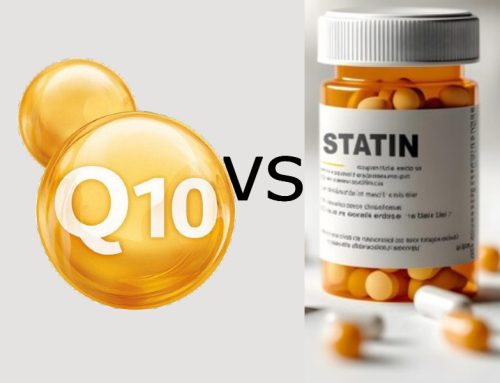
Dr. William V. Judy, the founder and president of the SIBR Research Institute, was one of the first researchers to raise questions about misleading marketing claims for Coenzyme Q10 products. Now he has written a book to share his knowledge of the relevant clinical research into the absorption, bio-availability, efficacy, and safety of CoQ10 supplements.
Coenzyme Q10 is, literally, the substance that powers life. It is an essential bio-nutrient required for the cellular process of ATP energy production. It is also an important fat-soluble antioxidant. Oral CoQ10 supplementation is positively associated with the reduction of blood bio-markers for oxidative stress and inflammation.
Now available from amazon.com is Dr. William Judy’s new book entitled Coenzyme Q10: An Insider’s Guide.
A simple search for the words Judy and Q10 will find the book on Amazon.
The book is comprised of case studies from Dr. Judy’s own experience and his summaries of the relevant CoQ10 research with respect to ageing, chronic fatigue syndrome, diabetes, exercise and training, heart failure, heart surgery, high blood pressure, and migraine.
- Dr. Judy explains the confusion caused by the introduction of oral ubiquinol products into the CoQ10 market.
- He provides a thorough walk-through of the issues surrounding CoQ10 absorption and bio-availability.
- He emphasizes the importance of taking a CoQ10 supplement if one is taking a statin medication.
- He points out that oral CoQ10 supplements vary considerably in their absorption and effect depending on their formulation.
Who is the Coenzyme Q10 Researcher Dr. William V. Judy?
Dr. Judy earned a Ph.D. in bio-physics and physiology in 1971. Early on in his career, he worked as an aerospace scientist with NASA, in the manned spacecraft center. Later, for many years, he served as a Professor of Physiology in the Indiana University School of Medicine.
Dr. Judy has done basic and clinical research on Coenzyme Q10 for over forty years. His introduction to Coenzyme Q10 research came about in meetings with Dr. Karl Folkers, the founder of the Institute for Bio-Medical Research at the University of Texas in Austin. It was Dr. Folkers who initially determined the precise chemical structure of the CoQ10 molecule.
Dr. Folkers recognized that CoQ10 is essential to the production of ATP energy in the mitochondria in the cells. He knew that low blood and tissue CoQ10 concentrations are associated with an increased risk of heart disease. He encouraged Dr. Judy to get involved in clinical studies of the effect of CoQ10 supplementation on heart muscle function.
At the urging of Dr. Folkers, Dr. Judy founded the SIBR Research Institute. He investigated the effect of Coenzyme Q10 supplementation:
- chronic fatigue syndrome patients
- heart failure patients
- heart surgery patients
- patients suffering from Adriamycin cardiotoxicity
- prostate cancer patients
- Prader-Willi syndrome patients
Dr. Judy is perhaps best known as the lead author of the 2007 seminal article on CoQ10 absorption and transfer entitled “Coenzyme Q10 Facts or Fabrications,” which can be found in pdf form on the Web.
 The Main Ideas in Dr. Judy’s Book
The Main Ideas in Dr. Judy’s Book
Coenzyme Q10 and Absorption and Bio-Availability
Dr. Judy reviews the difficulties related to producing an absorbable CoQ10 product from the crystalline raw material. The oral CoQ10 supplements sold in the United States and in Europe are not equal in absorption and bio-availability and are thus not equal in their clinical health effects.
Dr. Judy summarizes the results of the comparative bio-availability study conducted at the Pablo de Olavide University in Sevilla, Spain. In this study, the Coenzyme Q10 in a patented ubiquinone formulation using soybean oils as carrier lipids and produced with a special heating and cooling process was absorbed significantly better than the Coenzyme Q10 in a patented ubiquinol product and in five other ubiquinone formulations [Lopez-Lluch].
The best absorbed ubiquinone Coenzyme Q10 formulation in the Spanish study is the same preparation used in the Q-Symbio Study, the KiSel-10 Study, and the Gulf War Illness Study (see below).
Coenzyme Q10 and Ageing
Dr. Judy summarizes the results from the KiSel-10 study of the effect of joint supplementation of 443 senior citizens with a patented CoQ10 supplement (100 milligrams twice daily) and an organic high-selenium yeast supplement (200 micrograms daily) for four years. The active treatment with CoQ10 and high-selenium yeast resulted in significantly reduced risk of death from heart disease, improved heart function as seen on echocardiograms, and reduced blood levels of bio-markers for oxidative stress and inflammation and cardiac fibrosis [Alehagen 2013].
The significant beneficial effects of the combined supplementation persisted through the ten-year and 12-year follow-up periods [Alehagen 2015, 2018].
Coenzyme Q10 and Heart Failure
Dr. Judy summarizes the results of the multi-center international Q-Symbio Study, a randomized, double-blind, placebo-controlled clinical trial in which 420 chronic heart failure patients took 3 times 100 milligrams of a patented Coenzyme Q10 medicinal drug or matching placebos as an adjuvant therapy to conventional heart failure medications. The study data revealed that the adjuvant CoQ10 therapy significantly improved the symptoms and survival of patients [Mortensen 2014].
A sub-analysis of just the data from the European patients in the Q-Symbio Study showed that the CoQ10 supplementation significantly increased the patients’ ejection fraction [Mortensen 2019].
Coenzyme Q10 and Gulf War Illness
Dr. Judy summarizes the results of The Gulf War Illness Study. Daily supplementation of veterans with Gulf War Illness with 100 milligrams of CoQ10 for 3.5 months significantly improved scores on General Self-Rated Health surveys and improved various aspects of physical function and symptoms compared to placebo treatment [Golomb].
Coenzyme Q10 and Statin Medications
Dr. Judy emphasizes that the statin medications that inhibit the body’s production of cholesterol do so by blocking the biological pathway that leads to the body’s bio-synthesis of Coenzyme Q10. Moreover, the statin medications slow the incorporation of selenium into the antioxidant selenoproteins and inhibit the synthesis of vitamin K2.
In Dr. Judy’s opinion, it is impossible to make up for the loss of endogenous CoQ10 caused by the taking of statin medications by eating more or by eating more selectively. It is necessary to take a daily Coenzyme Q10 supplement if one is taking a statin medication.
Coenzyme Q10 in the Ubiquinol Form
Dr. Judy addresses some of the common misleading claims in the marketing of the reduced form of Coenzyme Q10, the ubiquinol form. Coenzyme Q10 is a redox molecule. It has an oxidized form (called ubiquinone) and a reduced form (called ubiquinol).
- The ubiquinone form of Coenzyme Q10 has been tested and documented in clinical trials since the early 1980s. It is the form that has been used in the most important clinical trials cited above.
- The ubiquinone form is the more stable form. It is the active form needed for the mitochondrial process of ATP energy production.
- In a recent comparative bio-availability study, the best formulated ubiquinone Coenzyme Q10 supplement yielded a significantly better bio-availability than the ubiquinol supplement [Lopez-Lluch 2019].
- Dr. Judy’s own lab studies and dog studies show that oral ubiquinol is mostly converted to the ubiquinone form of CoQ10 in the gastric juices of the stomach, is then absorbed in the ubiquinone form, and is converted back to the ubiquinol form in the lymph. Furthermore, his lab studies show that the ubiquinol in many ubiquinol capsules has already oxidized to the ubiquinone form inside the capsule. In other words, the consumer pays for ubiquinol and gets ubiquinone.
Conclusion: An Insider’s Guide to Coenzyme Q10 by Dr. William Judy
In his new book, An Insider’s Guide to Coenzyme Q10, Dr. Judy draws on his extensive research experience and knowledge of the relevant research literature to discuss the form and formulation of Coenzyme Q10 supplements.
The take-home message: Not all CoQ10 supplements are equally good; it is wise to select a CoQ10 supplement that has tested and documented absorption and bio-availability and clinical effects.
Read our key article on CoQ10 as adjuvant therapy for heart failure
Sources
Alehagen, U., Johansson, P., Björnstedt, M., Rosén, A., & Dahlström, U. (2013). Cardiovascular mortality and N-terminal-proBNP reduced after combined selenium and Coenzyme Q10 supplementation: a 5-year prospective randomized double-blind placebo-controlled trial among elderly Swedish citizens. International Journal of Cardiology, 167(5), 1860-1866.
Alehagen, U., Aaseth, J., Alexander, J., & Johansson, P. (2018). Still reduced cardiovascular mortality 12 years after supplementation with selenium and coenzyme Q10 for four years: A validation of previous 10-year follow-up results of a prospective randomized double-blind placebo-controlled trial in elderly. Plos One, 13(4), e0193120.
Alehagen, U., Aaseth, J., & Johansson, P. (2015). Reduced Cardiovascular Mortality 10 Years after Supplementation with Selenium and Coenzyme Q10 for Four Years: Follow-Up Results of a Prospective Randomized Double-Blind Placebo-Controlled Trial in Elderly Citizens. Plos One, 10(12), e0141641.
Golomb, B. CoQ10 and Gulf War illness. Neural Computation 2014 Nov; Vol. 26 (11), pp. 2594-651.
Folkers K., Brown R., Judy W.V., and Morita M. (1993). Survival of cancer patients on therapy with coenzyme Q10. Biochem. Biophys. Res. Comm., Ms. No. G-8658.
Judy, W.V., Hall, J.H., Toth, P.D., & Folkers K. (1986). Double-blind-double crossover study of coenzyme Q10 in heart failure. In: Folkers K., Yamamura Y. (eds) Biomedical and clinical aspects of coenzyme Q, vol. 5. Elsevier, Amsterdam, pp 315-323.
Judy, W.V., Hall, J. H., Dugan, W., Toth, P.D., & Folkers K. (1983). Coenzyme Q10 reduction of Adriamycin toxicity. In: Biomedical and Clinical Aspects of Coenzyme Q, vol. 4, Folkers K., Yamamura Y., (eds) Elsevier, Amsterdam, pp 231-241.
López-Lluch, G., Del Pozo-Cruz, J., Sánchez-Cuesta, A., Cortés-Rodríguez, A. B., & Navas, P. (2019). Bioavailability of coenzyme Q10 supplements depends on carrier lipids and solubilization. Nutrition, 57, 133–140.
Mortensen, S. A., Rosenfeldt, F., Kumar, A., Dolliner, P., Filipiak, K. J., Pella, D., & Littarru, G. P. (2014). The effect of coenzyme Q10 on morbidity and mortality in chronic heart failure: results from Q-SYMBIO: a randomized double-blind trial. JACC. Heart Failure, 2(6), 641-649.
The information contained in this review article is not intended as medical advice and should not be used as such.








Leave A Comment